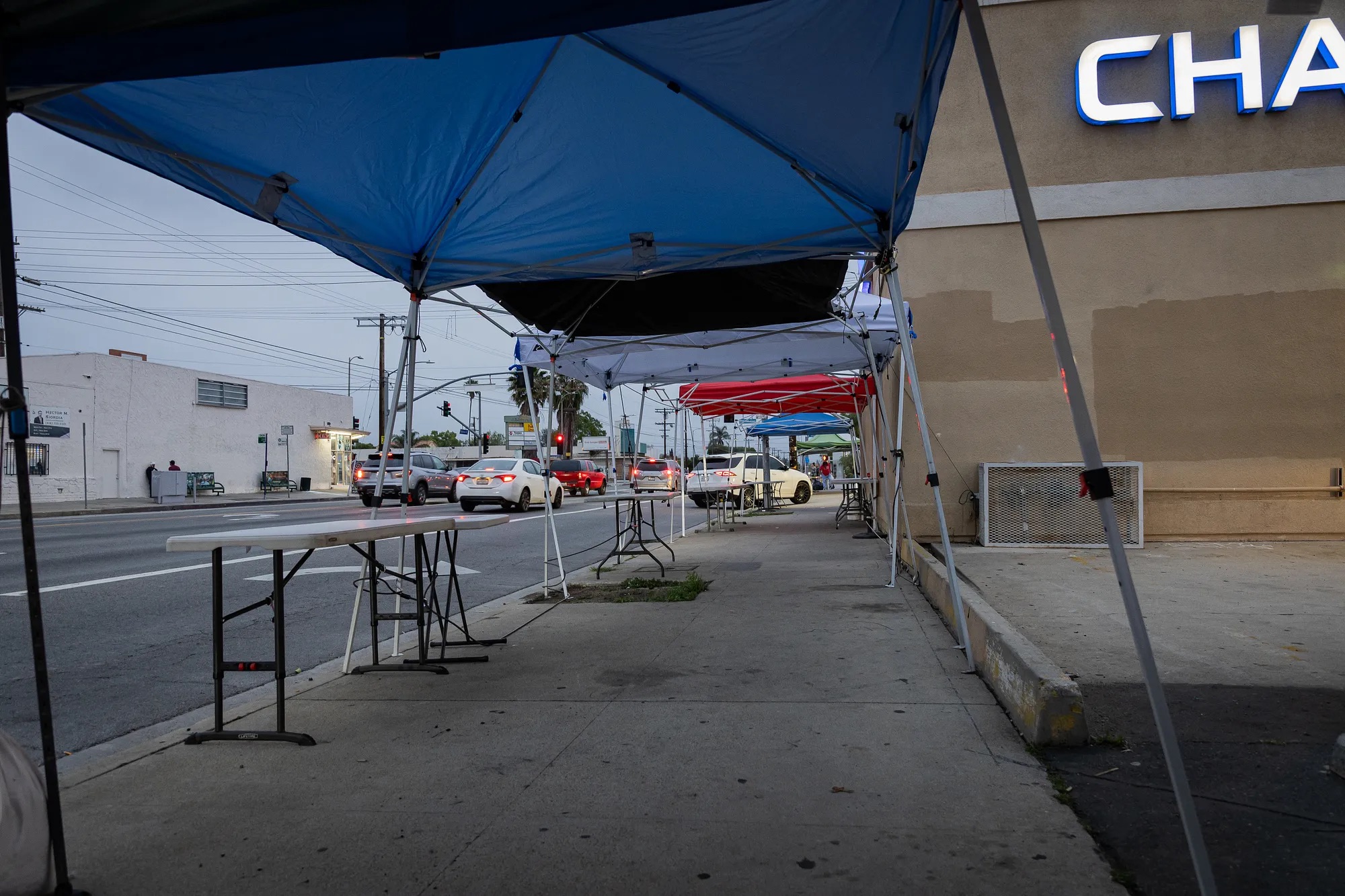When Patricia Lopez and Antonio Camacho (their names have been changed for their privacy) left Veracruz for the United States twenty years ago, they hoped to find a better life for their children.
In Mexico, Lopez was a secretary and Camacho was a veterinarian. Now, they run a successful street vending business in Los Angeles where they’ve catered for various groups for two decades, including the local police department. For 20 years, it has been not only their full-time job, but their passion project.
But everything began to crash down when Donald Trump began his second presidential term, introducing harsh immigration policies that are forcing Camacho and Lopez to consider the possibility of self-deporting back to Mexico.
Trump’s crackdown on immigration could be disrupting Los Angeles’ thriving street vending industry. In some cases, it already has. Some vendors have reduced their presence on the street, like Camacho and Lopez, who have gone from working five days a week to only vending on the weekends.
This is where Change in Our Neighborhoods Community Development Corporation (ICON), a local nonprofit, comes in. Elizabeth Padilla is the organization's vending manager and shared that the street vending industry is intertwined with Los Angeles culture. Having it wiped away would drastically affect L.A.’s economy.
“We’ve noticed a shift in people interested in starting a street vending business earlier in the year,” said Padilla. She recalled that when ICON was doing outreach work, they noticed that some of their clients weren’t out in the streets selling.
“Some have shared that they’re scared to show up because they feel like they might be deported,” said Padilla.

This could hurt the livelihood of undocumented people who rely on street vending as their main source of income. Los Angeles’s streets currently support around 50,000 street vendors, 10,000 of which sell food. The street vending industry generates $500 million per year and vendor expenditures stimulate around $517 million in the city’s economy.
“People like to see the negative side of street vending,” said Padilla. “But, they don’t realize that they’re creating jobs, some are applying for loans, and they’re paying taxes.”
According to the California Budget and Policy Center, in 2022, undocumented immigrants contributed $8.5 billion in state and local taxes.
Street vendor Jose Mendez, who has been vending in the Pacoima area since early December, said that recent immigration policies have reduced business.
Mendez, who is originally from Jalisco, explained that some customers shared their fear of leaving their homes due to recent immigration raids occurring in Southern California.
“There aren’t a lot of people out on the streets who are buying or vending … and it’s because they’re scared that they might be scooped by Immigration,” said Mendez.
A 2019 Urban Institute study found that one in six non-citizens avoid everyday activities that could potentially raise the risk of being asked about their citizenship status. 7.8% of individuals reported that they avoid public outings like going to the grocery store, parks, or libraries.

With fewer customers showing up at Mendez’s stand, he had to adapt to new ways of getting business. One of those alternatives include delivering to folks at their homes.
“Customers would call me and ask, ‘Could you deliver food to me?’,” Mendez said. “It’s been like this since February and I had delivered more to people in March.”
Despite his efforts to deliver to his customers, Mendez shared that deliveries haven’t brought back the income he was receiving in December and January.
“I have to pay rent, pay off my truck, and the prices of goods aren’t making it easier on my pockets,” he said.
Similar financial issues have arisen for Lopez and Camacho since they made the decision to sell only on the weekends. Meanwhile, fear has grown. Camacho shared that even cutting down their work days to the weekends still gives him some worry.
“When I take the trash out at the end of selling, I fear that the border patrol will be around the corner,” said Camacho. “But at the end of the day, we still have to sell because we need to pay our rent and other things.”
There have been efforts made to ensure protections for street vendors.
“We are working closely with Inclusive Action For the City and others to ensure further protections of [street vendor] vulnerability,” said Angelica Salas, the executive director of Coalition for Humane Immigrant Rights (CHIRLA), during a press conference in early March.
Salas shared that legislation brought by State Senator Maria Elena Durazo (D-Los Angeles) would prohibit local authority from providing sensitive information on street vendors to immigration enforcement without a subpoena or a warrant. The bill would also prohibit local authorities from collecting personal information about an individual’s immigration status, among other things, as part of an application for a permit license.
But some undocumented street vendors shared that these steps do not make them feel any safer and think that it’s just a matter of time when they’ll be caught by ICE.

In March 2025, the Department of Homeland Security released its international multimillion-dollar ad campaign to discourage immigrants from coming to the United States. The ad, which stars Secretary of Homeland Security Kristi Noem, specifically states that if a person is in the United States illegally, they have the opportunity to self-deport and enter the country “the right way.”
A street vendor, who wished to remain anonymous, shared that while there is a lot of turbulence around immigration, she would not stop working.
“Everyone that is in this country is scared of course, but one has to stay positive,” said the vendor.
Though she has not seen a substantial change in her business, the vendor shared that if there aren’t pathways for immigrants who have been in the country for many years to receive a form of status, then she would consider self-deporting.
Available data shows that there have been at least 1,065 arrests made by ICE in Los Angeles in the 2025 fiscal year so far. These numbers nearly reached what the start of the 2024 fiscal year showed: 1,283.

When asked if he would self-deport if immigration policies continue to worsen, Mendez carefully answered that he won’t take drastic measures just yet, but it’s not off the table.
“I just need to look out for my kids and wife,” he said.
But, deportation under a Trump administration worries Lopez a lot more than previous administrations.
“I’m scared that we might end up in the same situation as the Venezuelan guy,” said Lopez, referring to the 20-year-old Venezuelan man who was wrongfully deported to a notorious maximum security prison El Salvador. “We’re not criminals, we pay taxes, we’ve been good.”
“At any moment, they can take us, they can report us, so I would rather that we just self-deport,” said Lopez.
This article was originally published on Medium.







